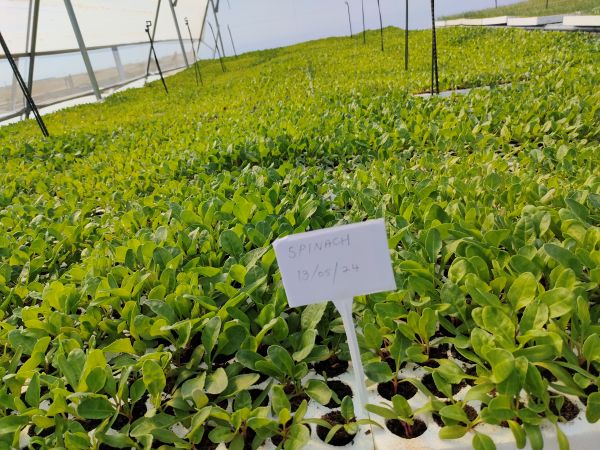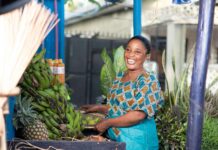By : Angelina Makwela and Elizabeth Ralefatane
With a deeply entrenched history of inequality, South Africa continues to grapple with high levels of poverty, food insecurity, and unemployment. In 2023, more than half of the population (55.5%) lived below the poverty line, while unemployment stood at 34.5% (Stats SA, 2023).
For many rural and peri-urban communities, the challenge goes beyond jobs, it is about putting food on the table. The Department of Agriculture, Land Reform and Rural Development (DALRRD) reported in 2022 that smallholder and subsistence farming supports food security for approximately 2.5 million households. Yet, in 2024, nearly one in four South African households experienced hunger (Stats SA, 2024).
Globally, the Food and Agriculture Organization (FAO) reports that more than 282 million people in Africa face hunger, with sub-Saharan Africa carrying the highest burden. These figures underscore the urgency of strengthening local food systems and the importance of community-led initiatives like Seriti Institute’s nurseries, which place solutions directly in the hands of those most affected.
Community driven intervention
Responding to this crisis, the Seriti Institute, a South African community development facilitation agency, has established vegetable nurseries in Limpopo (Bela-Bela), Northwest (Deelpan), Mpumalanga (Standerton) and KwaZulu-Natal (Inchanga). These nurseries are more than farming hubs, they are symbols of renewal, offering communities the tools to fight food insecurity, poverty, and dependency.
The initiative not only provides high-quality vegetable seedlings but also prioritises varieties that are familiar and essential to local communities. This ensures that farmers can access preferred crops year-round, aligned with their planting schedules.
This results in improved crop yield, enhanced biodiversity, and increased resilience to changing weather conditions. Additionally, the availability of diverse seedlings enables farmers to diversify their crops, reduce dependency on single varieties, and boost income by meeting market demands more effectively. Establishing nurseries in marginalised communities provides a direct means to combat poverty by generating new income sources, and offering educational opportunities. Moreover, making quality seedlings more affordable enables local farmers to cultivate crops more effectively, stimulating agricultural activity and strengthening food security.
This strategy complements the government’s Agricultural Production Input Support Program (ASPSP), which helps small-scale farmers obtain agricultural inputs at reduced or no cost, further supporting the empowerment of local farming communities (Mkhonto, 2019).
A Measurable Impact
To ensure continuity and sustainability, Seriti Institute employs key implementation strategies to ensure long-term impact. The organisations uses a collaborative development approach, ensuring that each project aligns with community needs and maximises local impact by forming partnerships and collaborations with local leaders, farmers, and organisations.
Working with partners such as SEF, Citi Foundation, 11th Hour, DGMT, the Foundation for Human Rights, and others, Seriti Institute has amplified its impact and ensured that more households benefit from these interventions.
By June 2025, Seriti’s nurseries had already produced 938,702 seedlings. Behind this milestone are families who can now grow nutritious food, farmers who sell surplus for income, and communities that are building resilience against hunger
“As one farmer from the Lekwa Together Cooperative in Mpumalanga shared: “Seriti provided us with a new income-generating opportunity by supplying seedlings to help us get started. This support has given us renewed hope for the future.”
In conclusion, Seriti Institute’s focus on sustainable seedling production not only enhances agricultural output but also revitalises underutilised land, turning it into a source of food and income. By addressing poverty, food insecurity, and environmental sustainability together, the initiative offers a powerful model of community-driven development. In a country marked by inequality, Seriti demonstrates how local solutions can drive resilience, dignity, and long-term change , offering valuable lessons for other regions facing similar challenges.
Reference List
- Department of Agriculture, Land Reform and Rural Development (DALRRD), 2022. Annual Report. Pretoria: Government of South Africa.
- Food and Agriculture Organization of the United Nations (FAO), 2023. The State of Food Security and Nutrition in the World. Rome: FAO.
- Mkhonto, S., 2019. Agricultural Production Input Support Program (ASPSP): A Policy Review. Pretoria: Department of Agriculture, Forestry and Fisheries.
- Statistics South Africa (Stats SA), 2023. Quarterly Labour Force Survey: Quarter 4, 2023. Pretoria: Stats SA.
- Statistics South Africa (Stats SA), 2024. General Household Survey 2024: Food Security and Hunger. Pretoria: Stats SA.








